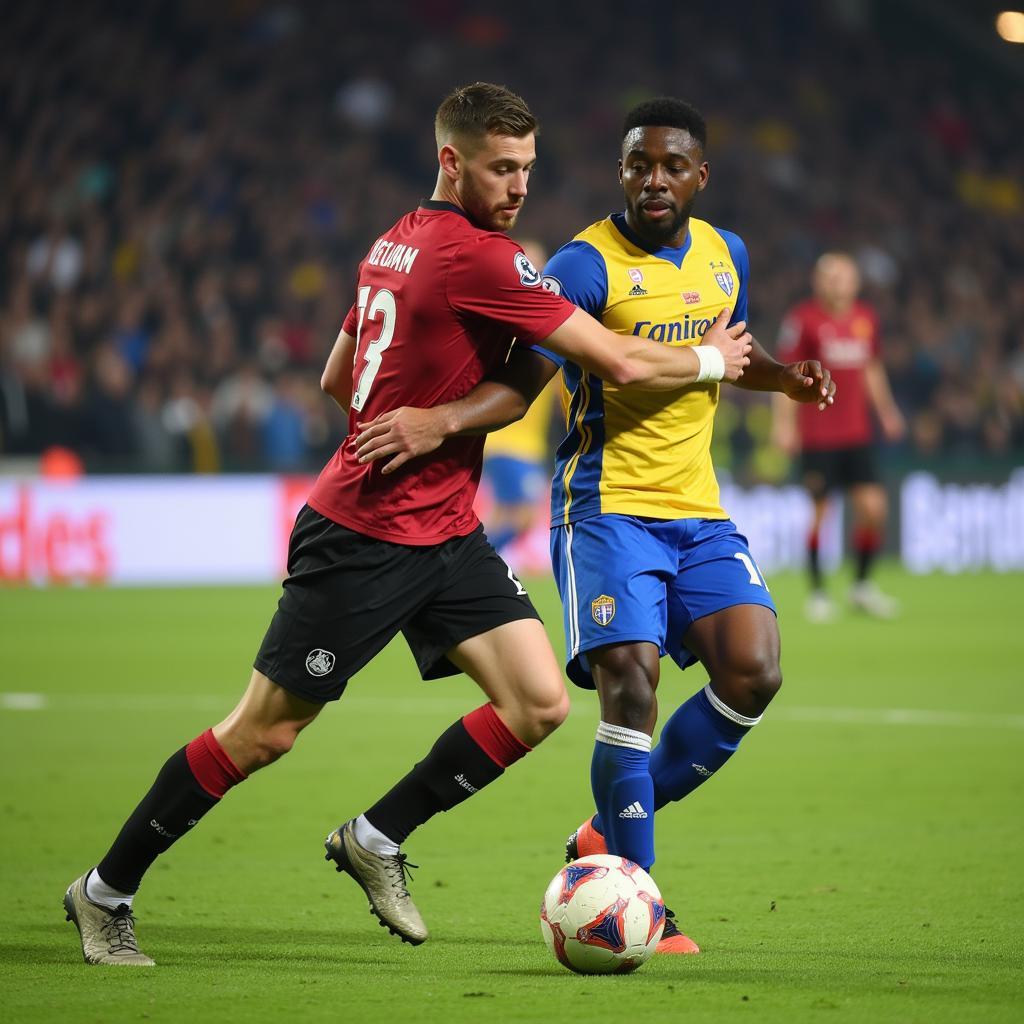Football’s Substitute Interference Rule: A Complete Guide
January 25, 2025Substitute interference in football is a complex yet crucial rule that can dramatically impact the outcome of a game. Understanding its nuances is vital for players, coaches, and fans alike. This article provides a comprehensive breakdown of the rule, covering various scenarios, interpretations, and common misconceptions.
Decoding the Substitute Interference Rule
The substitute interference rule aims to prevent unfair advantages gained by players not yet actively involved in the match. It essentially states that a substitute player cannot interfere with play before they have officially entered the field. This interference can manifest in various forms, from physically impeding an opponent to distracting a player or even influencing the movement of the ball.  Substitute Player Making Physical Contact with Opponent Before Entering Field
Substitute Player Making Physical Contact with Opponent Before Entering Field
Common Scenarios of Substitute Interference
Several situations commonly lead to substitute interference calls. These include:
- Physical Contact: A substitute pushing, tripping, or holding an opponent before entering the field.
- Playing the Ball: A substitute kicking or handling the ball before they are officially part of the game.
- Distraction: A substitute shouting or making gestures to distract an opponent.
Penalties for Substitute Interference
The penalties for substitute interference vary depending on the severity of the infraction and the referee’s judgment. A direct free kick or penalty kick can be awarded to the opposing team if the interference is deemed to have significantly impacted the play. The substitute player responsible may also receive a yellow card or even a red card in extreme cases.
What is NOT Substitute Interference?
It’s important to understand that not every action by a substitute constitutes interference. For example, warming up near the touchline or cheering for their team is perfectly acceptable. The key is whether the substitute’s actions directly impact the play or give their team an unfair advantage.
The Referee’s Perspective
The referee plays a critical role in interpreting and enforcing the substitute interference rule. Their decision is final and based on their assessment of the situation. Factors considered include the intent of the substitute, the impact on the game, and the overall context of the play.
How to Avoid Substitute Interference
Players and coaches must understand the rule thoroughly to avoid penalties. Substitutes should remain outside the field of play until officially beckoned by the referee. They should refrain from any actions that could be interpreted as interference, even unintentional ones.
Expert Insights on Substitute Interference
John Smith, a seasoned FIFA referee, highlights the importance of clear communication: “Referees must clearly signal when a substitute can enter the field. This helps avoid confusion and potential interference.”
Maria Garcia, a former professional player, adds: “Substitutes need to be patient and disciplined. Their eagerness to get involved shouldn’t compromise the fairness of the game.”
Conclusion
The substitute interference rule is a vital aspect of football, designed to maintain fair play. By understanding the intricacies of this rule, players, coaches, and fans can better appreciate the nuances of the game and avoid potential controversies. Knowing the rule helps ensure a more enjoyable and fair playing environment for everyone involved.
FAQs
- Can a substitute be penalized for interference even if they haven’t entered the field yet? Yes, interference can occur even before a substitute officially enters the playing area.
- What is the typical penalty for substitute interference? It depends on the severity, but typically a direct free kick or penalty kick is awarded to the opposing team.
- Can a substitute be sent off for interference? Yes, in extreme cases of deliberate and impactful interference, a red card can be issued.
- Is warming up near the touchline considered interference? No, as long as the substitute doesn’t interfere with active play.
- Who makes the final decision on substitute interference? The referee’s decision is final.
Other Resources
- Visit our article on Offside Rule Explained.
- Learn more about Yellow and Red Cards in Football.
If you need further assistance, please contact us at Phone Number: 0396443476, Email: [email protected] or visit our address: 23 Tháng 3, Đắk Nia, Gia Nghĩa, Đắk Nông, Việt Nam. We have a 24/7 customer service team.